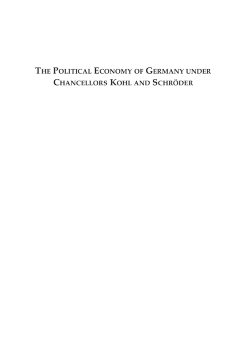
Additional Information
Book Details
Abstract
While unification has undoubtedly had major effects on Germany's political economy, the pattern of current policy-making preferences was established at an earlier stage, in particular, at the beginning of the 'Kohl-era' in 1982. This essentially neo-liberal pattern can be seen to have dominated the modalities chosen to guide Germany through the process of unifi cation and was mirrored in developments in other OECD countries and in particular within the EU. This book demonstrates that the three policy imperatives (neo-liberal structural reform, European monetary integration, and unification) produced a policy-mix which, together with other structural economic and demographic factors, has had disappointing results in all three areas and hampered Germany's overall economic development.
Jeremy Leaman is Senior Lecturer in German and European Political Economy at Loughborough University. He has published widely on German political economy and modern German history. He is currently working on a study of the political economy of taxation. He is also managing editor of the Journal of Contemporary European Studies and is a member of the editorial board of Debatte - Review of Contemporary Central and Eastern Europe.
“This excellent book does not only explore in detail the implications of the neoliberal paradigm shift and its harmful practices but analyses the ill-conceived regulations following German unification in 1990 very convincingly. It is also highly informative in its discussion of macro-political alternatives in the process of adapting to globalisation. Based on thorough knowledge of its subject, this book can be highly recommended to all scholars and students interested in the political-economic development of today’s Germany.” · Journal of Contemporary European Studies
“Leaman’s book is a passionate, well-argued piece that calls implicitly for the return to Keynesian economics to the center of economic policy that is to be conducted for the common good, not self interest. Even if Leaman does not provide a proper answer to how this return can be brought about, his significant and courageous contribution to the current economic debate is a must-read for anyone interested in the topic.” · German Studies Review
"...a superb manuscript...makes an important addition to the scholarly literature. Powerfully argued, it ranges very widely over political, economic, and financial developments, is based on a very good range of sources, and addresses an important set of issues on which there is very little in English, certainly not of book length. It 'translates' a wide range of German scholarship, while critiquing that scholarship and adding to it. It is well written in general, and there is a passion here that is rare in scholarly books." · Ray Stokes, Centre for Business History, Glasgow University
